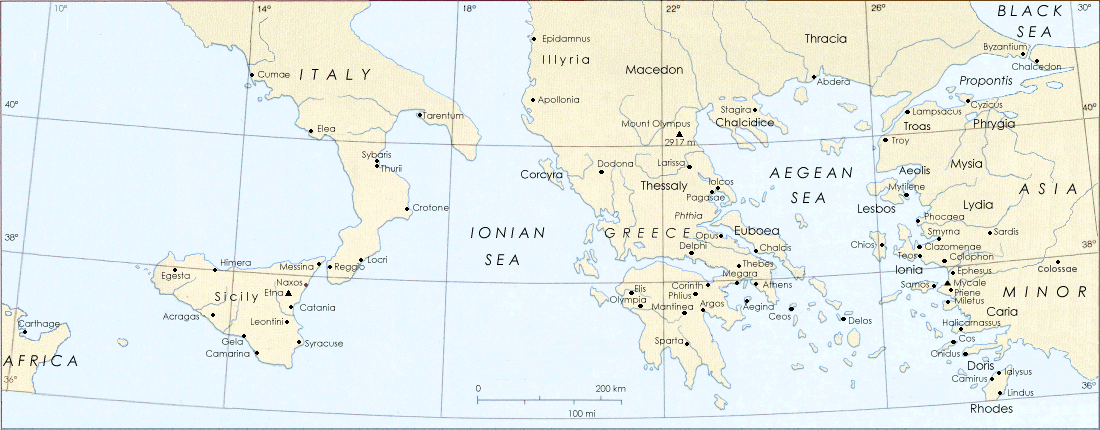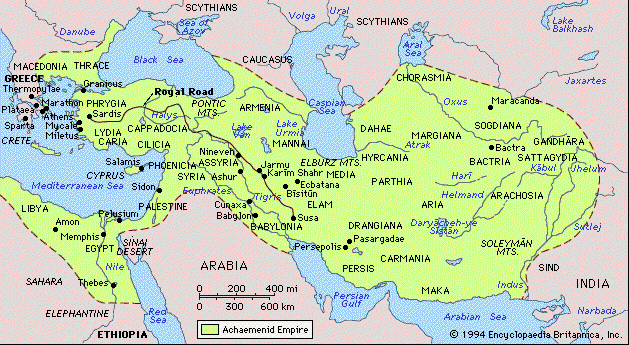
The Histories discussion: Book Five

Map (at source) is interactive
Although Athens had been a great city before, it became even greater once rid of its tyrants.
– from Paragraph 66So the Athenians had increased in strength, which demonstrates that an equal voice in government has beneficial impact not merely in one way, but in every way: the Athenians, while ruled by tyrants, were no better in war than any of the peoples living around them, but once they were rid of tyrants, they became by far the best of all. Thus it is clear that they were deliberately slack while repressed, since they were working for a master, but that after they were freed, they became ardently devoted to working hard so as to win achievements for themselves as individuals.
– Paragraph 78There was nothing he [Aristagoras] failed to promise them [the Athenians], since he was now in dire need, and at last he managed to win them over. For it would seem to be easier to deceive and impose upon a whole throng of people than to do so to just one individual, since he had failed with Kleomenes of Lacedaemon [Sparta], who was alone, but then succeeded with 30,000 Athenians. After the Athenians had been won over, they voted to dispatch twenty ships to help the Ionians and appointed Melanthion, a man of the city who was distinguished in every respect, as commander over them. These ships turned out to be the beginning of evils for both Hellenes and barbarians.
– from Paragraph 97(All quotes in this post are from The Landmark Herodotus with translation by Andrea L. Purvis)
In this Book, Herodotus narrates the first half of the Ionian revolt (approximately 499 – 497/6 BC). In addition he covers some Spartan and Athenian history, including Athens freedom from tyrants during a tumultuous last decade in the 6th century BC.
The strongest theme in this Book involves the cost of submission to tyrants or kings. Herodotus consistently praises those that fight for their freedom. Regarding Darius and Persian rule, we see entire cities/areas relocated on a whim in addition to administrators taking liberties with their subjects’ women. Recalling the previous Persian ruler, Herodotus highlights one of Cambyses cruel acts. After accusing a royal judge of accepting a bribe, Cambyses has the man flayed and his skin used as part of the official judicial chair. Following the recurring use of serving/exposing the dead bodies of fathers or sons to the other after a royally imposed murder (and the survivor expected not to mind), Cambyses appoints the victim’s son as the next judge.
Problems with submission can manifest indirectly. Appointed officials can make matters worse for their subjects even more than the king or tyrant might. Lykaretos, appointed governor by Darius over the recently defeated Lemnians, subjugated everyone as his personal slave. In addition, tyrants who start out nice can change and become cruel. Periandros of Corinth began as a relatively gentle ruler, but after consulting with Thrasyboulos (the tyrant of Miletus) he became more bloodthirsty than his cruel father. See the previous post for an extended quote on Periandros.
The fallout from Persian rule is not always as bad as Herodotus’ overall theme implies, which he acknowledges. Darius extends clemency to many Ioanian cities during the revolt. For some of the areas submitting to Persian rule, leaders was allowed to remain in power although a tribute would now be required. In Book Six we will see Darius creating democracies in some of the cities in order to solidify power. Even with occasional gentle rule, the threat in Greece from Persia is at a high level in 500 BC. Persia’s empire spans a large part of the known world and they have a foothold in Europe after the conquest of Thrace. Many of the Athenian tyrants at the end of the 6th century have been described by other historians as relatively benign. For Herodotus, gentle rule still means submission, which he views as odious. He clearly believes that the Athenian style of democracy as it stands at this point in time, that is an “equal voice in government”, was superior to other forms but he did not hesitate to point out its flaws (see the quote from paragraph 97 for one example). It will be an interesting comparison between Herodotus’ support of Athenian democracy, while acknowledging its flaws, and Aeschylus’ portrayal of it in The Persians (which I hope to discuss soon).
Herodotus champions liberty and points out the hypocrisy of free men wanting to subject others by using speeches of historical characters. Sokleas of Corinth, in answer to the Spartans’ wish to enlist allies to reestablish an Athenian tyranny, tells the Spartan leaders,
”If you really believe it to be a good policy to have cities ruled under tyrannies, then you should be the first to install a tyrant among yourselves before seeking to do so for everyone else. But as it is, you have no experience of tyrants, and in fact take the most dire precautions to prevent them from arising in Sparta, while you mistreat your allies. If you had experienced tyranny the way we have, you would be able to come up with better policies concerning it than you have now.”
During 507 BC, with threats of invasion from Sparta, an Athenian embassy was sent to Sardis in order to seek an alliance with Persia. The envoys, intent on achieving an alliance, offer earth and water in submission to Darius. Once the envoys return to Athens they were reprimanded for exceeding their commission. The question of how Athens was perceived by the Persians remains unanswered. Several years after this submission, Darius has to be told who the Athenians were. Several questions arise from the earlier submission. Was Athens seen as a subject city? Was the Persian empire so large that Darius weren’t aware of all of his subjects? When Athens assists in the destruction of Sardis eight years after this submission, was this seen as an act of internal revolt? Why did Darius send envoys prior to the invasion of 490 BC (in Book 6) to ask for submission if they already did so in 507 BC? (Update: now that I’m in Book Six I see where Darius did this to test for continued loyalty–which still raises the question of being ignorant, if he truly was, of Athens.) Was Persia aware of the rebuke of the envoys and consider Athens a non-subject city? Or, possibly the easiest way to reconcile these questions, did the first submission not happen?
The Histories arose out of the desire to record the conflict between the Greeks and Persia but it isn’t a good sign that squabbles (that escalate into skirmishes) between Greek cities happen often at this point. At the beginning of Book Five Herodotus makes the comment that Thrace could be invincible if its people united under a common ruler, but they can’t because of their constant squabbling. Left unsaid, but very much implied, is a similar outlook for the Greeks if they unite under a common cause. The Ionian revolt would be the trigger to place Persia and Athens in open conflict and temporarily curtail the intra-Greek skirmishes.
Athens and Persia are already on bad terms with each other when Aristagoros arrives with a request to free Miletus, a former Athenian colony now under Persian rule. Unfortunately the Athenians don’t know the history behind Aristagoros. This slippery character had used the pretense of helping Naxian exiles return to their land and, not coincidentally, augmenting his power. After enlisting the Persians for assistance the campaign stalls and Aristagoros, wishing to deflect blame for his failure, decides to stage a revolt against Persian rule in Ionian cities. The Athenians agree to help, sending men and ships to Sardis (the regional capital of Lydia) but their contingent leaves after Sardis is sacked and burned. Though the Athenians refuse to help Ionian cities after this point (although no explanation is given as to why), the damage between Athens and Persia is irrevocable. The desire to punish Athens grows as Darius, after finding out who the Athenians are, has an attendant “to repeat to him three times whenever his dinner was served: ‘My lord, remember the Athenians.’”
In addition to the theme of freedom versus submission, there are several other contrasts Herodotus provides. While he works a “good Greek/bad Persian” theme, the complexity in their differences becomes more complicated upon deeper evaluation. Herodotus holds the Persians in high regard for their achievements. One example: in this Book he goes into detail about their Royal Road and, among the benefits the road provides, is a mention on how safe it is to travel. This stood out for me since part of the Greek “guest-host” relationship is based on assuring safe travel. The freedom/submission conflict also highlights the difference between the rule of law and the rule of man. While Greek cities like Sparta and Athens have very different structures, their common respect for law will be highlighted as a theme once war starts with Persia.
One issue I have with this section lies in Herodotus’ assignment of the cause of Ionian revolt to the actions of Aristagoras and Histiaios. While the actions of and reasons behind Aristagoras and Histiaios may have occurred exactly as described, where and why did they get their support? There had to be something else driving people to engage in a revolt against such a formidable foe as Persia than simply restoring previous tyrants. The Landmark Herodotus in one of its 21 appendices looks in detail at some of the problematic areas of Herodotus’ account of the Ionian revolt. I won’t go into the same detail here, but it appears Herodotus had several biases influencing his inquiries.
Despite the muddled parts in this Book, The Histories continues to entertain. Stories included by Herodotus that make fun reading (although maybe not necessarily good history):
- Histiaios, after giving up his rule in Miletus at the order of Darius, wanted to get a message from the royal court at Susa to Aristagoras at Miletus. Knowing the roads would be watched and all communication intercepted, he shaved the head of his most trustworthy slave, tattooed a message to revolt on his scalp, and waited for the slave’s hair to grow back. The slave was sent to Miletus with only one instruction: tell Aristagoras to shave your hair and look at your head. (paragraph 35)
- Amyntas, king of Macedon, submits to the Persians. At the celebratory banquet, the Persian envoys request to see the Macedonian women. The drunken Persians molest the women and Amyntas meekly allows it to continue. His son, Alexandros, sends the king to bed and tells the Persians that they may have the women for the night but please permit them to bathe first. While the women are away, young men put on feminine garments and, seated beside the Persians, kill them and their entire retinue. In order to keep the envoys’ fate secret, Alexandros bribes the Persian general in charge of finding out what happened to the missing envoys, giving him money and his sister. Herodotus fails to mention what the sister thought of the arrangement. (paragraphs 18 – 21)
A note on a neat parallel in structure: at the very beginning of The Histories, Croesus of Lydia had inquired into the Athenians and Spartans and which would help him against the Persians. In Book Five, at the halfway point in the book and beginning the narrative on conflict between Persia and Greece, Aristagoras of Miletus seeks help from the same two cities in his revolt against Persia. The Book ends with the Aristagoras fleeing the conflagration he started in Ionia, Herodotus heaping scorn on his weak-spirited nature. Aristagoras heads to Thrace where he is killed trying to subject additional cities to his rule.
